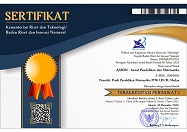UPAYA MENINGKATKAN KEMAMPUAN PEMECAHAN MASALAH KOMBINATORIK SISWA DENGAN MENERAPKAN MODEL PEMBELAJARAN PROBLEM BASED LEARNING DI KELAS XI SMA ISTIQLAL DELITUA
Abstract
Full Text:
PDFReferences
Abdurrahman, M., (2009), Pendidikan Bagi Anak Berkesulitan Belajar, Rineka Cipta, Jakarta.
Ali, R. 2010. Effect of Using Problem Solving Method in Teaching Mathematicson the Achievement of Mathematics Students. Asian Social Sciense, Vol 6 No 2.
Arends, Richard I. 2008. Learning to Teach (Belajar Untuk Mengajar) Buku 2, Edisi 7. Mc Graw Hill Companies.
Höveler, K. 2016. Children´S Combinatorial Counting Strategies And Their Relationship To Mathematical Counting Principles. Makalah disajikan dalam 13th International Congress on Mathematical Education Hamburg, 24-31 July 2016. TU Dortmund, Germany.
Syahputra, E. 2015. Combinatorial Thinking (Analisis Kesulitan Siswa dan Contoh Alternatif Model Matematika). PPs Universitas Negeri Medan. Makalah disajikan dalam Seminar Nasional Pendidikan Matematika HIPPMI. Medan 21 Nopember 2015.
Batanero, C., dkk. 1997. Combinatorial Reasoning and Its Assesment. In Gal, I. & Garfield, J. B. The Assessment Challenge in Statistics Education. Pp 239-252. ISBN 9051993331. University of Granada. IOS Press.
Halani, A. 2013. Students' Ways of Thinking about Combinatorics Solution Sets. Disertasi tidak diterbitkan. Arizona: Arizona State University.
Panen, P. (2002), Belajar dan Pembelajaran, Universitas Terbuka, Jakarta.
Rudiati, N. 2012. Implementasi Pembelajaran Berbasis Masalah (Problem Based Learning) Dengan Teknik Resitasi dalam Kurikulum Tingkat Satuan Pendidikan (KTSP) untuk Meningkatkan Kualitas Proses dan Hasil Belajar pada Materi Bentuk Pangkat dan Bentuk Akar Siswa Kelas X SMAN 1 Gondang Nganjuk Tahun Ajaran 2011/2012. Surabaya: Seminar Nasional Pendidikan Matematika Aplikasi Pendidikan Karakter dalam Pembelajaran. Surabaya.
Ruseffendi. E. T. 2005. Dasar-Dasar Penelitian Pendidikan dan Bidang Non-Eksakta Lainnya. Bandung : Tarsito.
Samosir, K. dan Siahaan,S., 2014. Penerapan Model Pembelajaran Kooperatif Tipe STAD yang Berorientasi Pada Pembelajaran Berdasarkan Masalah Pada Matematika Diskrit 2. Jurnal PARADIKMA, Vol.7(1) Halaman 12-23.
DOI: http://dx.doi.org/10.30821/axiom.v8i1.5449
Refbacks
- There are currently no refbacks.
Copyright (c) 2019 Ammamiarihta Ammamiarihta

This work is licensed under a Creative Commons Attribution-ShareAlike 4.0 International License.
p-ISSN: 2087-8249 | e-ISSN: 2580-0450
Indexed by:
AXIOM : Jurnal Pendidikan dan Matematika is licensed under a Creative Commons Attribution-ShareAlike 4.0 International License.











